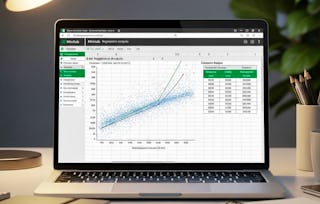This course allows learners to explore Regression Models in order to utilise these models for business forecasting. Unlike Time Series Models, Regression Models are causal models, where we identify certain variables in our business that influence other variables. Regressions model this causality, and then we can use these models in order to forecast, and then plan for our business' needs. We will explore simple regression models, multiple regression models, dummy variable regressions, seasonal variable regressions, as well as autoregressions. Each of these are different forms of regression models, tailored to unique business scenarios, in order to forecast and generate business intelligence for organisations.

Excel Regression Models for Business Forecasting

Excel Regression Models for Business Forecasting
This course is part of Excel Skills for Business Forecasting Specialization

Instructor: Assoc Prof Prashan S. M. Karunaratne
6,704 already enrolled
Included with
(110 reviews)
Skills you'll gain
Details to know

Add to your LinkedIn profile
16 assignments
See how employees at top companies are mastering in-demand skills

Build your subject-matter expertise
- Learn new concepts from industry experts
- Gain a foundational understanding of a subject or tool
- Develop job-relevant skills with hands-on projects
- Earn a shareable career certificate

There are 5 modules in this course
What's included
2 videos3 readings1 discussion prompt
In this module, we explore the context and purpose of business forecasting and the three types of business forecasting using regression models. We will learn the theoretical underpinning for a regression model, and understand the relationship between explanatory variables and dependent variables. We will first focus on single variable or simple regression, and learn how to critically evaluate the model using regression diagnostic tools and then use our models for forecasting to suit our organisation's needs.
What's included
4 videos3 readings4 assignments
In this module, we extend the simple regression model to take in multiple explanatory variables. We will extend the theoretical underpinning for a regression model by involving multiple dependent variables. We will learn how to critically evaluate the multiple regression models using regression diagnostic tools and then use our models for forecasting to suit our organisation's needs.
What's included
4 videos2 readings4 assignments
In this module, we extend the multiple regression model to take in qualitative binary explanatory variables. We will extend the theoretical underpinning for a multiple regression model by creating dummy variables for binary qualitative data. We will learn how to critically evaluate the dummy variable regression models using regression diagnostic tools and then use our models for forecasting to suit our organisation's needs.
What's included
4 videos2 readings4 assignments
In this module, we extend the binary dummary variable regression model to take in seasonal variables. We will extend the theoretical underpinning for a binary dummy variable regression model by creating a series of dummy variables to capture seasonality. We will learn how to critically evaluate the seasonal dummy regression models using regression diagnostic tools and then use our models for forecasting to suit our organisation's needs. In this module we will also explore autoregressions - their theoretical underpinning, creating an autoregression, critically evaluating this, and utilising our model for business forecasting. We will end the module by learning how to create a composite forecast by combining two forecasts across this course and the first course in this specialisation.
What's included
5 videos2 readings4 assignments
Earn a career certificate
Add this credential to your LinkedIn profile, resume, or CV. Share it on social media and in your performance review.
Instructor

Offered by
Explore more from Business Strategy
 Status: Free Trial
Status: Free TrialMacquarie University
 Status: Free Trial
Status: Free TrialMacquarie University
 Status: Free Trial
Status: Free TrialRice University
 Status: Free Trial
Status: Free Trial
Why people choose Coursera for their career

Felipe M.

Jennifer J.

Larry W.

Chaitanya A.
Learner reviews
- 5 stars
94.54%
- 4 stars
3.63%
- 3 stars
0%
- 2 stars
1.81%
- 1 star
0%
Showing 3 of 110
Reviewed on Nov 6, 2023
It was challenging and required me to really dig deep to understand the concepts, but the path was progressive in nature and the testing very hands on with the excel tools. Thank you.
Reviewed on Jul 5, 2023
One of the best course to learn Business forecasting and excel added cherry to toping.
Reviewed on Oct 4, 2024
When the students get the right direction, they will only find excellence :)

Open new doors with Coursera Plus
Unlimited access to 10,000+ world-class courses, hands-on projects, and job-ready certificate programs - all included in your subscription
Advance your career with an online degree
Earn a degree from world-class universities - 100% online
Join over 3,400 global companies that choose Coursera for Business
Upskill your employees to excel in the digital economy
Frequently asked questions
To access the course materials, assignments and to earn a Certificate, you will need to purchase the Certificate experience when you enroll in a course. You can try a Free Trial instead, or apply for Financial Aid. The course may offer 'Full Course, No Certificate' instead. This option lets you see all course materials, submit required assessments, and get a final grade. This also means that you will not be able to purchase a Certificate experience.
When you enroll in the course, you get access to all of the courses in the Specialization, and you earn a certificate when you complete the work. Your electronic Certificate will be added to your Accomplishments page - from there, you can print your Certificate or add it to your LinkedIn profile.
Yes. In select learning programs, you can apply for financial aid or a scholarship if you can’t afford the enrollment fee. If fin aid or scholarship is available for your learning program selection, you’ll find a link to apply on the description page.
More questions
Financial aid available,

